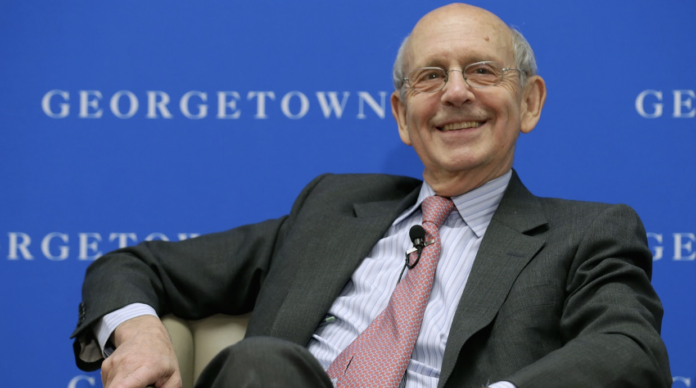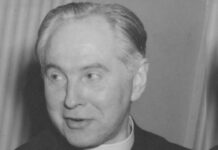![]()
Mar. 16, 2023, less than a year into his retirement, former United States Supreme Court Justice Stephen Breyer joined Jennifer Griffin in Gaston Hall, drawing celebratory applause in recognition of his twenty seven year career on the high court.
As a way of background, Justice Breyer’s acclaimed legal career began in 1964 as a clerk for Justice Arthur Goldberg. As an indication of his jurisprudence, Justice Breyer wrote the first draft of Justice Goldberg’s concurrence for Griswold v. Connecticut, arguing in favor of the right to privacy. He subsequently took a position in the U.S. Department of Justice’s antitrust division before joining Harvard Law School’s faculty in 1967. Known for his expertise in administrative law, Justice Breyer continued teaching for the next thirteen years with brief posts as a special prosecutor for Watergate and as the chief counsel of the U.S. Senate Judiciary Committee. In 1980, President Jimmy Carter appointed Justice Breyer to the U.S. Court of Appeals for the First Circuit. During his tenure, Justice Breyer authored many articles in legal journals about constitutional law and economics regulations, and played a highly influential role in creating the federal sentencing guidelines. From 1990 to 1994, he served as the Chief Judge of the First Circuit and was appointed to the U.S. Supreme Court in 1994. As a justice, he was known for his pragmatic approach to cases, emphasizing both constitutional history and real-life consequences. He believes in preserving the values of the Constitution while also applying them to cater to societal changes as they arise.
The discussion began with Justice Breyer reflecting on the judicial appointment process. While he joked of the senators who did not vote in favor of his 87-9 confirmation in 1994, Justice Breyer lamented the current situation, saying Justice Ketanji Jackson deserved more votes. He assured the audience that all justices on the Supreme Court truly follow the law, suggesting that politics only exist in the appointment process.
In light of the political polarization today, Justice Breyer urged students to talk to those whom they disagree with. From his experience working in the Senate, Justice Breyer observed that if we listen carefully enough, we will find points of agreement; he shared, “[if you] want to advance from where you are, don’t take 80 percent, take 20 percent [of the argument].” Citing how the people of Massachusetts knocked on each other’s doors to help those in need during the COVID-19 pandemic, Justice Breyer firmly believes that society is capable of coming together.
When asked about the issue of originalism, Justice Breyer responded with “oh, God,” a display of his pronounced humor and concern. He reflected on his dissenting opinion against Justice Antonin Scalia in a case pertaining to concealed carry, arguing that originalism is too outdated. Crediting Justice Scalia as a brilliant legal scholar, Justice Breyer maintains that current issues should be a priority, as opposed to citing “14th-century cases” of capitulating fire to inform gun control.
On the topic of his dissent in Roe v. Wade, Justice Breyer expressed his apologies for those who now need to travel across states to access safe abortions, recognizing the cost and resources that requires. Justice Breyer believes that the initial draft of Dobbs v. Jackson being leaked – which overturned Roe v. Wade – froze many justices into adopting their first draft decisions instead of amending it, as would usually happen. Nonetheless, in response to preventing further leaks, Justice Breyer said he would rather focus on the honesty of those working within the Supreme Court instead of turning the institution into the CIA.
Justice Breyer condemned the death penalty for not fitting the rationale for punishment; having been met with many rushed, high-profile criminal cases, Justice Breyer argued that it is almost random who is charged with the death penalty. He believes that its reasons to continue have weakened over time, as the deterrence and vengeance arguments have proven unproductive. In explaining his unusually long dissent of over forty pages, Justice Breyer asked the audience to carefully contemplate whether the death penalty goes against the Constitution’s prohibition against cruel and unusual punishments.
As a final piece of wisdom, Justice Breyer took out a carbon copy of the Constitution from his suit pocket, and shared, “it’s a big country and we disagree.” He then asked the audience to participate in the community, asserting that the Constitution will not work if we do not participate. “Don’t sit around and complain, because I can do that as well,” Justice Breyer jokingly concluded.












